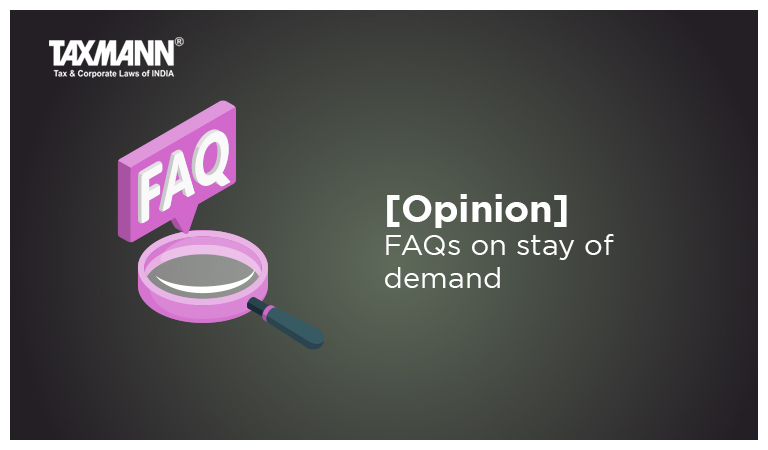[Opinion] FAQs on stay of demand
- Blog|News|Income Tax|
- 3 Min Read
- By Taxmann
- |
- Last Updated on 17 August, 2022

Mukesh Kohli – [2022] 141 taxmann.com 235 (Article)
Where an assessment is made against the assessee and the Assessing Officer issues a demand notice based on assessment order. The Assessee may file an application for stay of demand before the following authorities: –
I. Assessing Officer
II. Commissioner of Income Tax (Appeal)
III. Income Tax Appellate Tribunal
If the assessee feels that assessment of Income is unreasonably high then the Assessee can approach the Assessing officer for stay of demand.
There are various questions relating to the stay of demand that the author tries to answer in this article. Some of the questions are as under: –
Question 1. Can assessing officer grant stay of demand?
The assessing officer can grant stay of demand subject to payment of 20% of the disputed tax demand if an appeal is filed before the Commissioner (Appeal). The CBDT through its office memorandum F.No. 404/72/93-ITCC dated 29/02/2016 prescribed that stay can be granted subject to payment of 15% of the demand. However, this limit has been enhanced from 15% to 20% through another office memorandum F.No. 404/72/93-ITCC dated 31/07/2017.
Question 2. Can an assessing officer insist on a lumpsum payment which is higher than 20% of the Tax demand?
The Assessing officer can insist on a lumpsum payment which is higher than 20% of Tax demand in the following situations: –
(i) Where the Supreme court or jurisdiction High Court has decided the issue in Revenue’s favour on which issue the demand was raised by the department.
(ii) The assessee has past history of litigation and assessment on the same issue has been affirmed in appellate proceedings in the preceding years.
(iii) Survey operation has been carried out against the assessee or tax demand is based on credible evidence colleted in a search.
Question 3. Can a assessing officer grant stay on payment less than 20% of demand?
No, but he may refer the matter to the CIT. CIT may allow payment of less than 20% of the disputed demand if there are rulings which are in favour of the assessee either in his own case or by the jurisdiction High Court or by the Hon’ble Supreme Court.
Question 4. Is it necessary for the assessee to approach the assessing officer to stay the demand? Or is it necessary the A.O. must reject the assessee’s prayer for stay of demand?
No, the power of the appellate authority to stay the recovery of the demand of dues which are subject matter of appeal pending before him is independent of the provisions of section 220(6) and it is not necessary that before invoking the power of the first appellate authority, an assessee should approach the Assessing officer under section 220(6) or that the Assessing officermust reject the assessee’s prayer for stay of the demand.
The Hon’ble Allahabad High Court in the case of Tin Mfg Co. of India v. CIT [1995] 78 Taxman 249/212 ITR 451 held that Commissioner (Appeal) is vested with power of granting stay order for recovery of demand till disposal of appeal pending before him even if assessee has not approached the Assessing officer under section 220(6) or his application has not been decided.
The Hon’ble ITAT Delhi Benches in the case of Employees Provident Fund Organisation v. Addl. CIT [2015] 57 taxmann.com 41/839 ITR(T) 607/153 ITD 642 held that CIT(A) has inherent power to stay demand, when appeal is pending for disposal before him.
Click Here To Read The Full Article
Disclaimer: The content/information published on the website is only for general information of the user and shall not be construed as legal advice. While the Taxmann has exercised reasonable efforts to ensure the veracity of information/content published, Taxmann shall be under no liability in any manner whatsoever for incorrect information, if any.

Taxmann Publications has a dedicated in-house Research & Editorial Team. This team consists of a team of Chartered Accountants, Company Secretaries, and Lawyers. This team works under the guidance and supervision of editor-in-chief Mr Rakesh Bhargava.
The Research and Editorial Team is responsible for developing reliable and accurate content for the readers. The team follows the six-sigma approach to achieve the benchmark of zero error in its publications and research platforms. The team ensures that the following publication guidelines are thoroughly followed while developing the content:
- The statutory material is obtained only from the authorized and reliable sources
- All the latest developments in the judicial and legislative fields are covered
- Prepare the analytical write-ups on current, controversial, and important issues to help the readers to understand the concept and its implications
- Every content published by Taxmann is complete, accurate and lucid
- All evidence-based statements are supported with proper reference to Section, Circular No., Notification No. or citations
- The golden rules of grammar, style and consistency are thoroughly followed
- Font and size that’s easy to read and remain consistent across all imprint and digital publications are applied



 CA | CS | CMA
CA | CS | CMA

If AO assessment order is ex-pare without evidence and explanation. Appeal is filed to commissioner. Would AO grant full stay or have to apply to Commissioner because there is no income which attracts any tax liability. Appreciate you reply.
AO will not grant stay of demand unless atleast 20% of the demand is deposited. However, you may filed application before CIT who can grant stay based on merits of case, even if there is NIL payment by you.